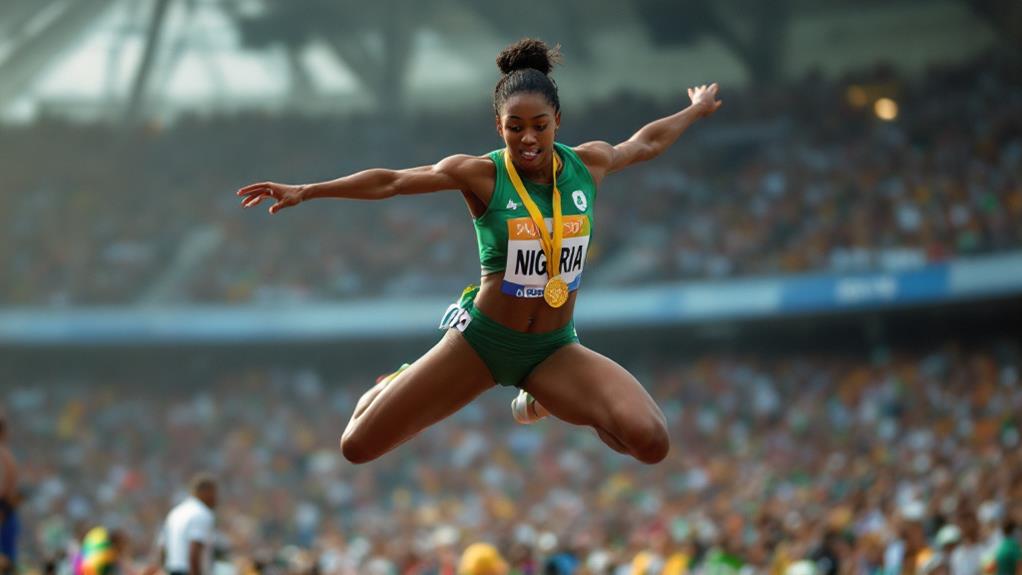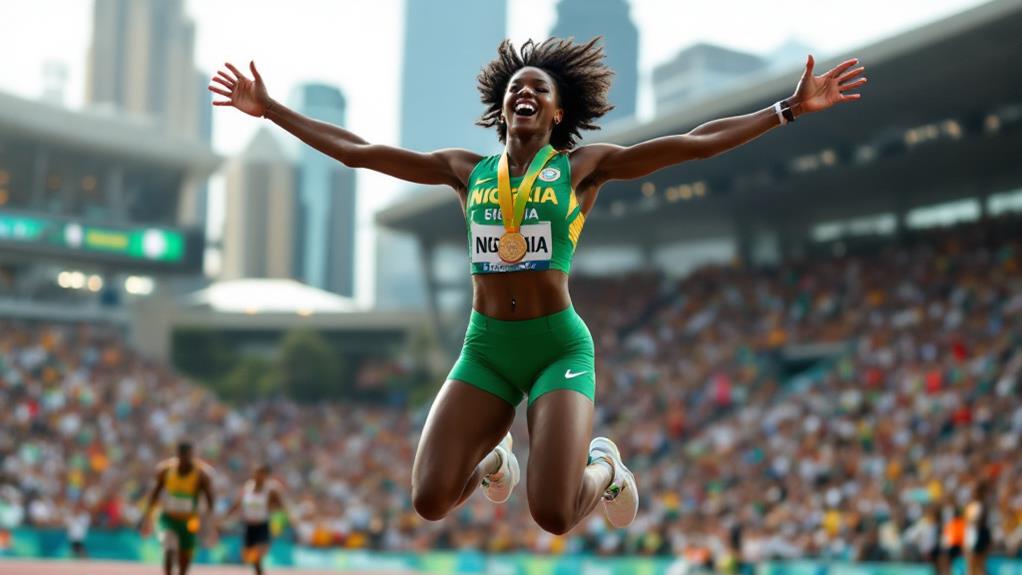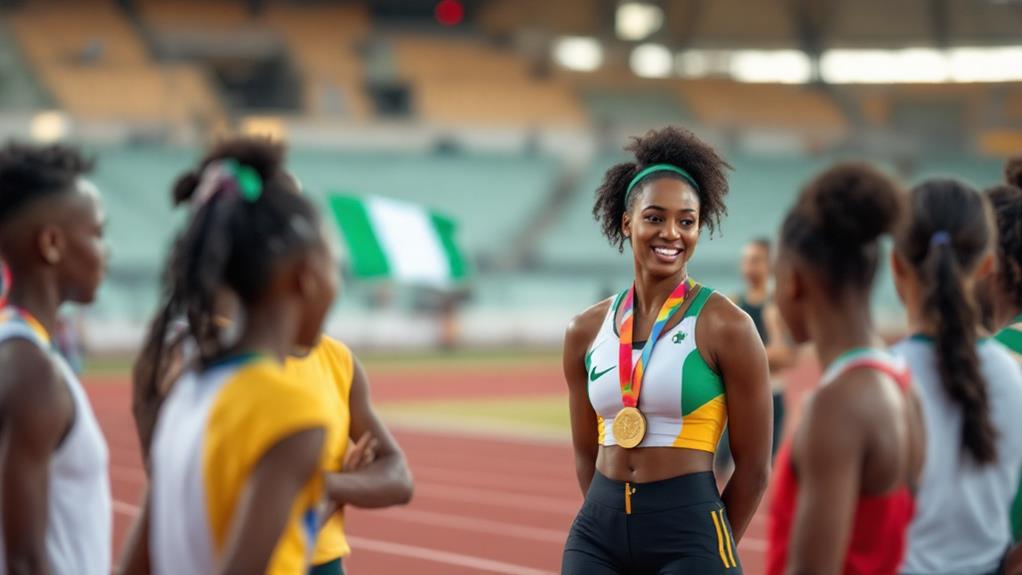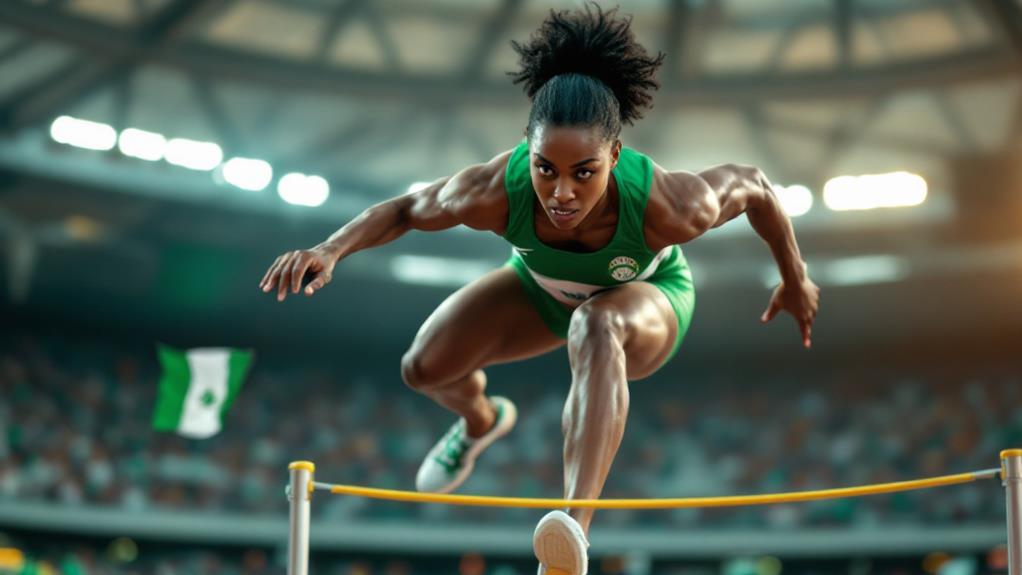Chioma Ajunwa: Nigeria's First Olympic Gold Medalist and Her Impact

Chioma Ajunwa is Nigeria's first Olympic gold medalist, clinching victory in the long jump at the 1996 Atlanta Games. She overcame financial struggles and a doping suspension to achieve this historic feat. Ajunwa's expedition from police officer to Olympic champion showcases her extraordinary determination. She's since become a prominent advocate for clean sports, launching anti-doping campaigns and workshops. Her legacy extends beyond athletics, as she's inspired countless Nigerian girls to pursue their dreams in male-dominated fields. Ajunwa's impact on Nigerian sports and society continues through her efforts to nurture young talent and promote fair competition. Her story of triumph and perseverance holds even more captivating details.
Early Life and Sporting Beginnings
Despite humble beginnings, Chioma Ajunwa's early life set the stage for her exceptional athletic career. Born in Ahiazu-Mbaise, Nigeria, as the youngest of nine children, she faced financial challenges that shaped her path. At 18, she gained university admission but couldn't register due to tuition fees, a setback that didn't deter her ambitions.
You'll find that Ajunwa's sporting expedition began during her school years, where she actively participated in athletics. This early exposure to track and field laid the foundation for her future as an Olympic athlete. While she initially trained as an automobile mechanic, her mother's disapproval led her to abandon this pursuit.
Ajunwa's versatility as an athlete became evident when she played as an attacker for the Nigerian women's national football team, the Falcons, during the 1991 Women's World Cup. This experience in team sports complemented her individual athletic abilities, preparing her for the challenges ahead.
Little did anyone know that this young Nigerian would go on to become the country's first Olympic gold medalist, making history in the field of track and field.
Football Career and Transition
Versatility marked Chioma Ajunwa's early athletic career, with her football prowess shining through as she played for the Nigerian women's national team, the Falcons, during the 1991 Women's World Cup. As an attacker, she displayed exceptional skill on the pitch, quickly becoming one of the best players on the team. However, her excursion in football wasn't without challenges.
Despite her talent, you'd often find Ajunwa on the bench, a puzzling decision that ultimately led her to reconsider her path in sports. This setback, though disheartening, became the catalyst for her transition to track and field events. Even before fully committing to athletics, Ajunwa had already tasted success, winning a bronze medal in the 4x100m relay at the 1990 Commonwealth Games.
Her decision to leave football and focus on athletics would prove life-changing, setting the stage for her future Olympic glory. Ajunwa's adventure from the football pitch to the track exemplifies:
- Resilience in the face of adversity
- The courage to change paths
- Determination to excel in multiple sports
- Shattering barriers for women in Nigerian athletics
- Inspiring future generations of athletes
Olympic Glory in Atlanta

Triumph awaited Chioma Ajunwa at the 1996 Summer Olympics in Atlanta. As she stepped onto the track for the women's long jump event, little did she know she'd make history. With a remarkable leap of 7.12 meters, Ajunwa clinched the gold medal, becoming Nigeria's first Olympic gold medalist and the first African woman to claim gold in a field event at the Olympics.
You can't underestimate the significance of Ajunwa's achievement. Her victory broke new ground for Nigerian athletics, which had struggled to make its mark on the global stage. Despite facing challenges, including a suspension for alleged drug use that was later cleared, Ajunwa's determination shone through. Her Olympic glory brought immense joy and recognition to Nigeria, inspiring future generations of athletes.
Ajunwa's gold medal performance in Atlanta became a landmark moment in Nigeria's sporting history. It showcased the potential of Nigerian athletes and paved the way for future success. As a result of her extraordinary feat, Chioma Ajunwa cemented her status as a national hero and trailblazer, leaving an unforgettable mark on Olympic history.
Overcoming Challenges and Controversies
In spite of her Olympic glory, Chioma Ajunwa's path to success wasn't without its obstacles. She faced a four-year doping suspension in 1992, despite maintaining her innocence. However, she turned this setback into an opportunity, launching an anti-doping campaign and advocating for fair competition.
Ajunwa's resilience shone through as she continued her track and field career, ultimately achieving her historic Olympic triumph. Yet, even in her moment of glory, she faced confusion and uncertainty about the significance of her achievement. Upon returning to Nigeria as a national hero, she encountered disappointment in the lack of support for athletes.
Determined to make a difference, Ajunwa's focusing on sports development for the next generation. She's planning to establish a sports development center in her home state, seeking support to nurture young talent.
- You'll feel inspired by Ajunwa's perseverance in the face of adversity
- You'll admire her commitment to clean sports and fair competition
- You'll be moved by her dedication to improving opportunities for young athletes
- You'll be frustrated by the lack of support for Nigerian athletes
- You'll be hopeful for the future of sports development in Nigeria
Post-Retirement Advocacy and Service

Chioma Ajunwa's dedication to sports and fair competition didn't end with her retirement from athletics. She joined the Nigerian Police Force, serving for 35 years and rising to the rank of Deputy Commissioner of Police. This career shift allowed her to continue making a significant impact on Nigerian society.
You'll find Ajunwa's post-retirement efforts focused on promoting fair play and anti-doping measures in sports. She became a passionate advocate, providing lectures and organizing workshops to raise awareness about the dangers of doping. Her personal "Compete Fair & Clean" initiatives, launched in collaboration with the Athletics Federation of Nigeria, demonstrate her commitment to this cause.
As a role model for aspiring athletes and women in male-dominated fields, Ajunwa used her platform to inspire others. Her appointment as Chairperson of the Women's Development Committee of the Imo State Football Association showcases her dedication to promoting women's participation in sports. Additionally, her involvement in reviving Nigeria's Academicals Sports Competitions highlights her ongoing efforts to support the growth and success of Nigerian athletes. Through these various roles, Ajunwa continues to shape the future of sports in Nigeria, emphasizing integrity and fair competition.
Awards and Recognition
Throughout her extraordinary career, Chioma Ajunwa has garnered numerous awards and accolades recognizing her exceptional achievements and contributions to Nigerian sports. After her historic Olympic gold medal win in 1996, Nigeria's Head of State Sani Abacha awarded her the Member of the Order of Niger (MON). This prestigious honor acknowledged her pioneering achievement as Nigeria's first-ever individual Olympic gold medalist.
Ajunwa's home state, Imo, also celebrated her success by conferring a chieftaincy title upon her. This traditional recognition further solidified her status as a national hero. In 2010, she received Nigeria's Golden Jubilee Independence Award, highlighting her lasting impact on the country's development through sports.
Ajunwa's influence extends beyond her athletic achievements:
- Inspiring young Nigerian girls to pursue their dreams
- Overcoming barriers in male-dominated sports
- Representing Nigeria on the global stage
- Promoting the importance of women in sports
- Serving as a role model for perseverance and dedication
While Ajunwa didn't compete in the FIFA Women's World Cup, her Olympic gold medal paved the way for increased recognition of women's sports in Nigeria. Her continued involvement in sports administration, including her role with the Nigerian Police, demonstrates her ongoing commitment to developing athletics in the country.
Anti-Doping Campaign and Initiatives

Building on her legacy as an Olympic champion, Ajunwa has taken a strong stance against doping in sports. In 2010, she delivered a paper on "War against the use of illicit Drugs in Sport" to raise awareness about the dangers of doping. Later that year, she launched her personal "Compete Fair & Clean" anti-doping campaign, demonstrating her commitment to promoting clean sports.
You'll find that Ajunwa's efforts extend beyond speeches and campaigns. She's organized awareness workshops and seminars in collaboration with the Athletics Federation of Nigeria, educating athletes and coaches about anti-doping initiatives. Her approach is multifaceted, including the placement of banners with anti-doping messages at athletic events to reinforce the importance of fair competition.
Ajunwa's campaign has also involved distributing informative publications and t-shirts with anti-doping messages to athletes and coaches. This grassroots approach guarantees that her message reaches those most directly involved in athletics. Through these initiatives, she's working tirelessly to create a culture of clean sports in Nigeria and beyond, leveraging her status as an Olympic gold medalist to inspire ethical competition.
Legacy and Future Vision
Ajunwa's legacy carries on through her tireless efforts to inspire and uplift the next generation of Nigerian athletes. As Nigeria's first Olympic gold medalist and a trailblazer for women in sports, she's become a role model for aspiring athletes across the nation. Her path from police officer to Olympic champion showcases the power of determination and perseverance.
Chioma Ajunwa's contributions to the development of Nigerian athletics extend far beyond her historic leap in Atlanta. She's dedicated her life to nurturing young talent and advocating for better sports infrastructure in Nigeria. Through her foundation and public speaking engagements, she continues to touch the lives of countless aspiring athletes.
Her vision for the future of Nigerian sports includes:
- Empowering young girls to pursue their athletic ambitions
- Improving training facilities and resources for athletes
- Advocating for better support systems for retired athletes
- Promoting drug-free sports and fair competition
- Encouraging government investment in sports advancement
As the first Nigerian to win an individual Olympic gold medal, Ajunwa's impact on the nation's sporting domain is immeasurable. Her legacy is celebrated by distinguished Nigerians and friends of the country alike, inspiring future generations to reach for gold in all their undertakings.



